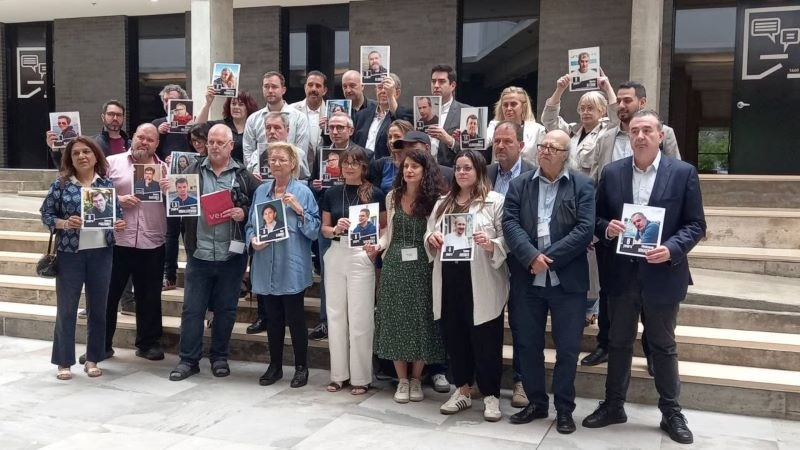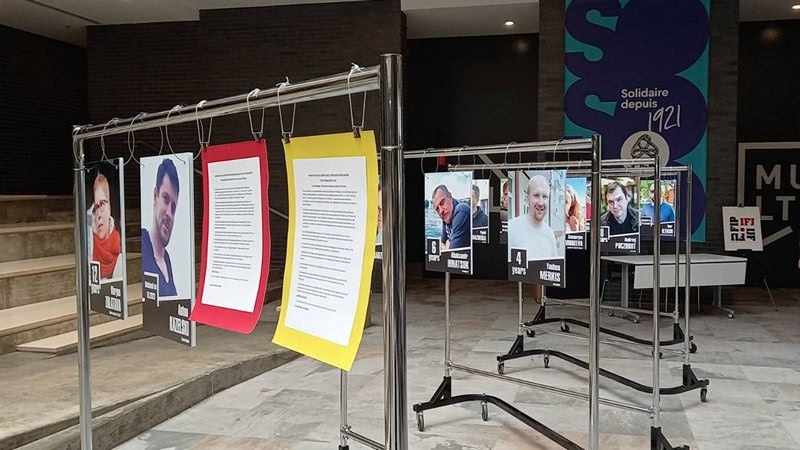“It is crucial that Belarusian jailed journalists are not forgotten”, says BAJ chairperson Andrei Bastunets
Andrei Bastunets, BAJ chairperson, will address the current situation of journalism in Belarus, examine the circumstances facing Belarusian exiled journalists and share the work BAJ carries out to help its journalist colleagues.

Andrei Bastunets, BAJ chairperson. Photo by BAJ
The Belarus Association of Journalists (BAJ) will inaugurate the photo exhibition ‘Media Prison in the Centre of Europe’, as part of the International Federation of Journalists (IFJ)‘s Annual General Assembly and Executive Committee meetings, held from 9 to 11 June in in Montreal, Canada in coordination with its affiliate, the Fédération nationale de la communication et de la culture (FNCC-CSN).
Belarus is the biggest jailer of journalists in Europe. Could you describe the state of journalism and media freedom in the country?
A.B: It has now been four-and-a-half years since the protests against the fraudulent presidential elections in Belarus were brutally suppressed. However, the country’s repression against society, the opposition, and journalists continues to this day.
Aliaksandr Lukashenka, who has been in power in Belarus for over 30 years, has called civil society and independent media a “tumour” that must be cut out. In an interview with a BBC journalist, Lukashenka warned: “…We will cut out all the scum that you have financed.” The authorities have been carrying out this order. Almost 2,000 non-governmental organisations have been shut down in Belarus, including the IFJ-affiliated Belarusian Association of Journalists (BAJ), which was banned in 2023.
When the BAJ continued its work in exile, we were labelled an extremist group, and our communications channels, – our website, social media, even our logo – were declared extremist materials.
This is the current situation for almost all independent Belarusian media. They are forced to work in exile and have been designated as ‘extremist groups’ in their home country.
However, the hardest part for me and the BAJ is the people who ended up behind bars. Forty journalists and media workers are imprisoned in Belarus today. They have received harsh sentences – some up to 12 or 14 years – just for performing their professional duties.
According to Reporters Without Borders, Belarus is the leading country in Europe in terms of the number of imprisoned journalists. In total, about 1,200 people in Belarus have been officially recognised as political prisoners, and that number is likely incomplete.

IFJ representatives stand in solidarity with imprisoned Belarusian journalists during the Annual General Meeting and Executive Committee meeting in Montreal, Canada, on 10 June. Credit: BAJ
However, I don’t want to talk about numbers. I’d prefer to talk about individuals. Even in my worst nightmares, I couldn’t imagine that so many of my good acquaintances and close friends – journalists and human rights defenders – would end up behind bars.
Harassment and persecution of journalists by Lukashenka’s regime goes beyond the borders of Belarus. Could you explain the situation facing Belarusian journalists in exile?
Even when they have left the country, Belarusian journalists cannot feel safe, because their rights are still restricted by the government in their country of origin. So they cannot sell their homes or cars in Belarus, since the authorities require their presence in the country for these transactions. Moreover, if the exiled journalists return to Belarus, they and BAJ members are threatened with arrest. Exiled journalists cannot even renew their passports when these expire, since embassies have stopped issuing passports to citizens living abroad: this directly impacts all those who fled repression. Consequently, more and more Belarusians living abroad have expired passports. And authorities in the countries where they are exiled cannot always help these people to obtain official documents.
Belarusian authorities are increasingly using the “special proceedings” as a tool of repression. These include the so-called criminal convictions of exiled journalists, activists and politicians in absentia, as well as the possibility of confiscating their property in Belarus.
Families of exiled citizens suffer from pressure and harassment. Criminal police do searches in their apartments and these family members are summoned to law enforcement agencies for interrogations, or threatened with punishment, among other tactics.
In 2023 the BAJ was labelled an ‘extremist’ group and banned in Belarus. What did this mean for the Association? How does BAJ help Belarusian journalists in exile?
To prevent the activities of independent media, authorities continue to apply legislation on countering extremism. The majority of independent media and media organisations, including the BAJ, have been labelled in Belarus as extremist groups. At the beginning of 2025, 257 organisations were on the government’s list of extremist groups.
This ban means that every activist and leader of the BAJ is in direct danger of arbitrary criminal prosecution in Belarus – just for doing our awareness-raising, advocacy and campaigning activities in support of our colleagues in need. To help exiled journalists, the BAJ team organises courses on information security. It also helps BAJ members who are being prosecuted, such as providing them with legal assistance and leading international advocacy campaigns.
What can unions and journalists across the world do to support Belarusian journalists?
Solidarity means a lot to Belarusian journalists nowadays. The BAJ continues its Marathon of Solidarity with imprisoned Belarusian journalists and media workers. Since this initiative was launched in May 2023, the marathon has been supported 43 times in 26 countries, 35 cities and on almost all continents. The campaign has been supported by the IFJ, EFJ, IFEX, Reporters Without Borders, Global Affairs Canada, Journalists for Human Rights, and others.
It would be extremely helpful if unions and journalists could help us arrange evacuation and temporary retreats for the families of imprisoned Belarusian journalists, especially their children. The BAJ would also welcome any other feasible support to amplify the voices of BAJ members and journalists in Belarus and in exile. This support would be deeply appreciated.
As part of the IFJ’s Annual General Assembly and Executive Committee meetings in Montreal, the Belarus Association of Journalists (BAJ) will inaugurate the photo exhibition ‘Media Prison in the Centre of Europe’. Could you tell us more about this?
Forty journalists are currently behind bars in Belarus. Independent media workers are sentenced to long prison terms – eight, 13, 14 years in jail… just for carrying out their professional duties. The Belarusian authorities regard them as ‘extremist activities’, ‘arrangement of mass riots’, or ‘treason’.
The BAJ keeps reminding our journalist colleagues across the world of the ongoing horrors faced by independent journalists in Belarus. In this world of conflicts and wars, it is crucial to ensure that Belarus, Belarusian media and imprisoned Belarusian journalists are not forgotten – and to ensure we do not become a blank spot on the world map.
The world is changing rapidly with wars, armed conflicts, and trade problems. Human rights’ violations in Belarus, the international community’s inability to influence dictators, and a lack of punishment for those suppressing rights and freedoms in our country… These are unfortunately all fading into the background.

The photo exhibition Media Prison in the Centre of Europe. Credit: BAJ
The photo exhibition Media Prison in the Centre of Europe is our cry for help, addressing the international media community. It is essential for every member of the BAJ to feel the solidarity of the journalistic community and to see that we, as Belarusian journalists, are not forgotten.
We need your support as part of the global media community. Join us in demanding that the Belarusian authorities release journalists from prisons in Belarus: Free them all!
Let’s stick to the truth, let’s keep together.
Interview by Natàlia Queralt, IFJ Campaigns and Communications Officer.
 @bajmedia
@bajmedia
